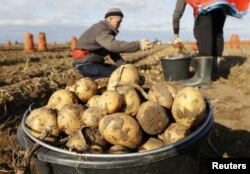The International Labor Organization warns multiple economic and political crises, largely triggered by the war in Ukraine and economic disruption in China, are threatening the recovery of the global labor market.
The ILO Monitor on the World of Work published Monday finds worsening labor market conditions are affecting both employment creation and the quality of jobs.
The report says multiple overlapping crises — including the highest inflation rates for a decade, tighter monetary policies, and increasing debt burdens — are sapping consumer and business confidence. It says signs of global labor recovery seen early this year have withered away.
The ILO estimates the number of hours worked globally in the third quarter of this year was 1.5 percent below pre-pandemic levels. This is equivalent to a loss of 40 million full-time jobs.
ILO Director-General Gilbert Houngbo says this downward trend is largely driven by the economic disruption in China and the fallout from the war in Ukraine.
"For China, what essentially we are saying is the disruption caused namely by quite very strict measures taken in reference to the management of the COVID-19 situation … also the global tightening of the fiscal monetary measures and the impact that could have on the domestic consumption," Houngbo said.
In addition to the terrible humanitarian cost, the report notes the war in Ukraine is having a negative impact on the country's economy and labor market. The ILO estimates 2.4 million Ukrainians have lost their jobs this year because of the conflict.
Houngbo says the impact of the war is being felt globally in rising food and fuel prices, increased food insecurity and poverty. He says Russia's invasion of Ukraine is affecting and disrupting the labor markets and economies of neighboring countries.
"For example, in Tajikistan, the World Bank is projecting a 40 percent fall in migrant workers' remittances. And in Kyrgyzstan, a 33 percent decline. This trend will easily shift into political and social destabilization," Houngbo said.
Authors of the report express concern that most of the job growth that exists is concentrated in the informal sector. This, they say, is jeopardizing the positive trend that has been made in the last 15 years toward formalizing employment.
They say progress in narrowing the gender gap in employment also is at risk and the economic gap between developed and developing countries is widening.





